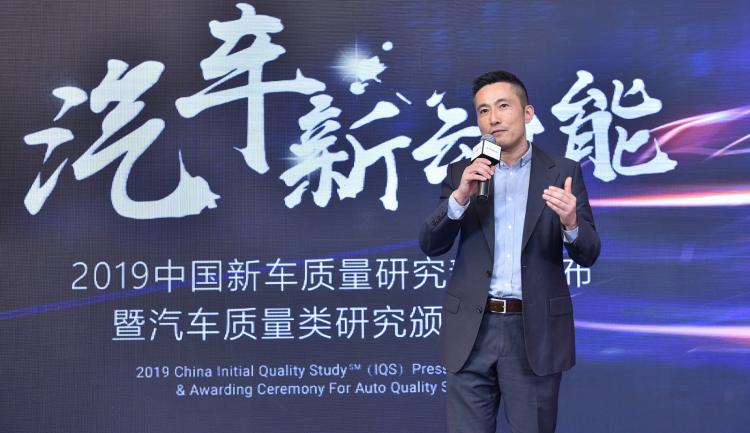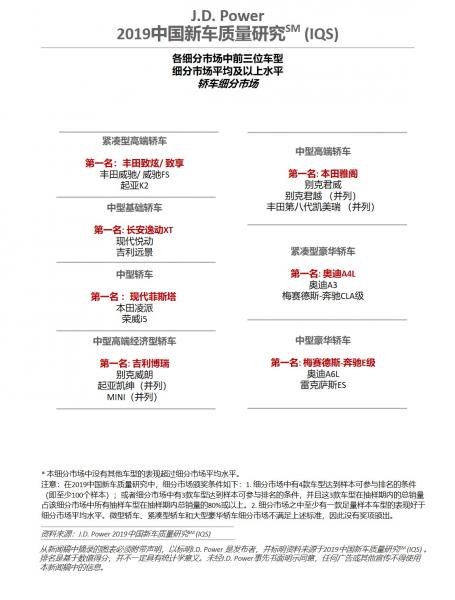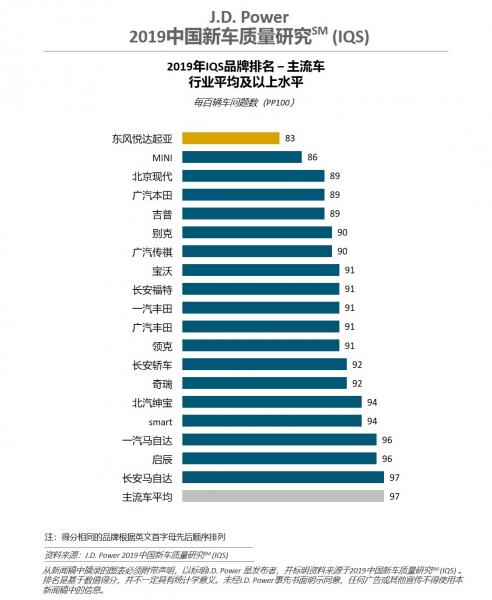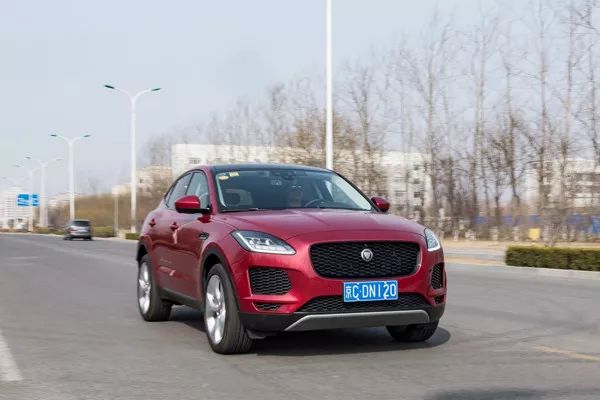On August 8, 2019, JD Power (Jundi), the world’s leading consumer insight and market research organization, released the 2019 China New Car Quality Study SM (IQS) today, showing that the number of new car quality problems in China’s auto industry has decreased significantly, and the overall new car quality Substantially improved. Of the 67 auto brands included in the study, 52 performed better than last year.

This year is the 20th consecutive year that JD Power has conducted the China Initial Quality Study (IQS). This research focuses on the quality problems encountered by new car owners who have owned a car for 2 to 6 months. The new car quality score is expressed in terms of the average number of problems per 100 cars (PP100). And the better.

Research shows that the average new car quality score in the industry this year is 95 PP100 points, which is 10 PP100 points lower than last year, and the increase rate is as high as 10%. Six of the eight study categories improved, with the biggest improvements in body interiors (down 2.9 PP100), audio/communication/entertainment/navigation (down 2.9 PP100) and seating (down 2.2 PP100 ).

Cai Ming, general manager of JD Power China’s automotive product division, said: “JD Power’s follow-up research on the Chinese auto market shows that the overall quality of new cars in China’s auto industry has finally made significant progress this year after a five-year period of stability, indicating that the automotive Manufacturers have taken practical and effective measures to listen to the ‘voice of customers’ and improve consumer satisfaction. It is worth noting that such progress has been made in the context of poor sales in the auto market, which is not easy.”

The following are the key findings of the 2019 study:
· Although the overall quality of new cars in the industry has improved significantly, some problems that consumers complained about have not been effectively improved: the top 20 problems that consumers complained about this year generated a total of 51.4 PP100, higher than last year’s 49.9 PP100, and among them The performance of 12 question points has regressed from last year.
Significant improvement in the quality of self-owned brands: Although the number of problems of self-owned brands is the largest among all brands of origin, it has made significant progress compared with itself. The number of problems has dropped from 115 PP100 last year to 101 PP100 this year, an improvement of 12%. And seven of the eight major problem categories have improved, and the only problem category that has regressed is the engine/transmission system (an increase of 2.1 PP100).
· The gap between self-owned brands and international brands continues to narrow: In the past three years, the average quality gap between self-owned brands and international brands has remained at 14 PP100, and this year the gap between the two has narrowed to 9 PP100.
Top-Rated Makes and Models
Audi (73 PP100) won the first place in new car quality in the luxury car segment. Lexus and Porsche (76 PP100) tied for second in new car quality in the luxury segment.
Dongfeng Yueda Kia (83 PP100) ranked first in new car quality in the mainstream car segment, MINI (86 PP100) ranked second, Beijing Hyundai, GAC Honda and Jeep (89 PP100) tied for third. GAC Trumpchi (90 PP100) ranked first among China’s independent brands for the seventh consecutive year.
A total of 18 models from 15 brands won 17 market segment awards in the 2019 China New Car Quality Study.
· Among the GAC Toyota brands, Toyota Zhixuan/Zhixiang and Toyota C-HR won awards at the model level.
· Audi A4L and Audi Q3 won awards at the model level.
· Volkswagen Tuyue and Volkswagen Touran L won awards at the model level for the SAIC Volkswagen brand.
Other models that received awards in their respective market segments include Baojun 730, Changan Eado XT, Chery Tiggo 3x, Geely Borui, Honda Accord, Honda Elysion, Hyundai Festa, Lexus RX, Mercedes-Benz E Class, Porsche Cayenne, Toyota Prado and WEY VV6.
The Initial Quality Study (IQS) is one of JD Power’s flagship industry joint studies globally and in China. The study clearly divides new vehicle quality issues into two broad categories: design flaws and malfunctions/inoperability. The specific diagnostic questions include 233 problem points in 8 categories (body interior, body appearance, engine/transmission system, driving experience, configuration/control/instrument panel, seat, audio/communication/entertainment/navigation and air conditioning system).
The 2019 China Initial Quality Study (IQS) is based on real feedback from 33,468 car owners who bought cars between May 2018 and March 2019. The research covers 266 vehicle models from 67 brands, and data collection was conducted in 75 major Chinese cities between November 2018 and May 2019.
Attachment: The specific awards and rankings of the research








